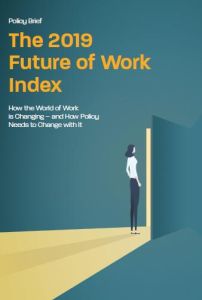
Read or listen offline
Recommendation
As technology rapidly disrupts industries, so too does it disrupt workers’ lives. To avoid being left behind, one thing is clear: You need to upgrade your skills. Traditional, full-time jobs are disappearing, replaced by new, flexible opportunities – if workers are ready to take advantage of them. Governments can help support individuals’ efforts by providing necessary training along the way, and by designing safety net policies that support people, while at the same time protecting businesses that in the past have shouldered much of the burden. In its 2019 Future of Work Index, the Lisbon Council for Economic Competitiveness and Social Renewal compares the countries of the European Union for the health of their labor and business markets, and the flexibility of their social safety net policies to meet the challenges of a swiftly changing global economy.
Take-Aways
About the Authors
The Lisbon Council for Economic Competitiveness and Social Renewal is a policy think tank based in Brussels.















Comment on this summary or Start Discussion